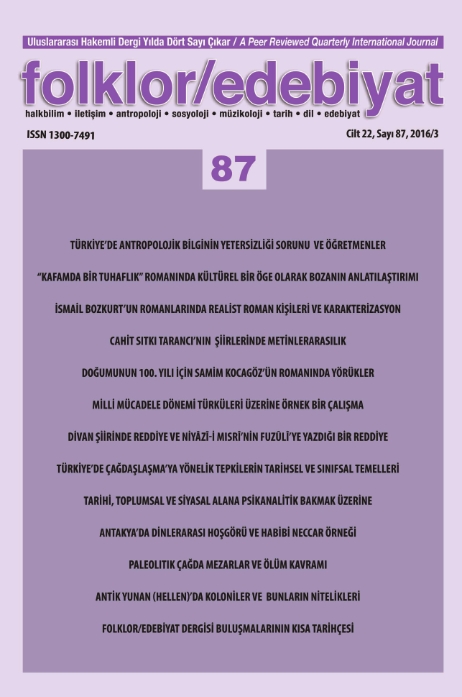Türkiye’de Çağdaşlaşma”Ya Yönelik Tepkilerin Tarihsel Ve Sinifsal Temelleri
Historical and Class Basis of Reactions Towards Modernization in Turkey
Author(s): Mehmet Devrim TopsesSubject(s): Social history, Turkish Literature, Cultural Anthropology / Ethnology, Social development, Social differentiation
Published by: Uluslararası Kıbrıs Üniversitesi
Keywords: Modernization; Turkish Modernization; Tanzimat Reform Era; Social Event; Social Classification;
Summary/Abstract: Modernization term is a process of disintegration social institutions from traditions. As modernization process which began in Turkey in 18th Century has fell short of social goals, it also get reactions from Turkish society. In this article, the reasons of overallnegative reactions of society and aforesaid failure are discussed in background (social class and economical) extent of modernity process. In the process which includes more than two hundred historical periods, peasentry class that constitutes predominant majority of the society are oppressed and excluded from society, only a small group benefit from innovations and regulations. In reality, Modernity process is not the reason for impoverishment and oppression of wide majority of Turkish society. However impoverishment and oppression process of peasentry class that began in 16th century continued the process of modernity that began in 18th century and deepened. For this reason all the images of modernity process constitutes manner, behavior and life habits that Turkish society seen as responsible either openly or secretly. The subject area of the article includes the era which started in Selim the third period and the end of one party term in 20th century. Social reactions towards modernization in Turkey are exemplified with four social eventsoccurred in 2015. These events are general elections that is in 2015, national football matches that are played in Konya and Istanbul, Kebab and Turnip Festival which is attacked as it includes alcohol, and reactions towards New Year celebrations. The reason for selection of only these examples to objectify reactions towards modernization process is because these social events constitute the most powerful agenda items in 2015. Two basic ways are followed to collect historical content data. Firstly, researches with sociological-content that are related with this period are used. In reality, Turkey has a rich sociological literature that researches the social structure between 18th and 20th century. Secondly, social-realistic kind of literature, which aims to reflect the period as it is, is used. In Turkey, an attempt which aims to use social-realistic native literature kinds in sociology area is still new. Besides, products of realistic-social literature kinds’ focusing on social realities and their aiming of reflecting social realities as it is, makes them one of the primary data collection tools.
Journal: Folklor/Edebiyat
- Issue Year: 22/2016
- Issue No: 87
- Page Range: 123-136
- Page Count: 14
- Language: Turkish

